“That’s it. That must be it. Thank you, Rocco!”
I almost screamed through the telephone as I concluded my call. Halfway across the globe, in the Netherlands, it wasn’t even dark yet but here, in South Korea, it was close to midnight. I still saw a light in Changwoo’s office, so I ran downstairs to share my conclusions with him. “I think we will have to disassemble the brake master cylinder,” he said before I could utter a word. He was sitting behind his desk with a large grin on his face and I couldn’t resist one myself.

A few days earlier I had almost driven into a line of cars at a traffic light. Karin-Marijke and I were coming down a mountain when the brakes failed and pulling the handbrake while shifting down gears had saved us (as well as the cars in front of us). This had not been our first brake problem. In fact, the past year the brakes had given us—and others—massive headaches. Frustratingly, nobody had been able to figure out what the problem was.
Fast forward: in a workshop near Seoul, a couple of dedicated guys were set on solving this issue while I called on the international community for help.
At the Romance Factory
When we turned into the Romance Factory workshop, I had my doubts that we could solve the Land Cruiser’s brake problems there. The shop was famous for building and equipping stock vehicles for traveling, ranging from luxury SUVs to dual-cab pickup trucks. Mr. Fish and Changwoo combined their excellent design and construction skills to create and install nifty storage systems. Before our arrival they had committed themselves to helping me build a partition for the upcoming RoRo shipment to Russia, repairing the Land Cruiser’s oil-bath air cleaner, as well as helping me fix some other minor matters. There had never been any talk about brakes.
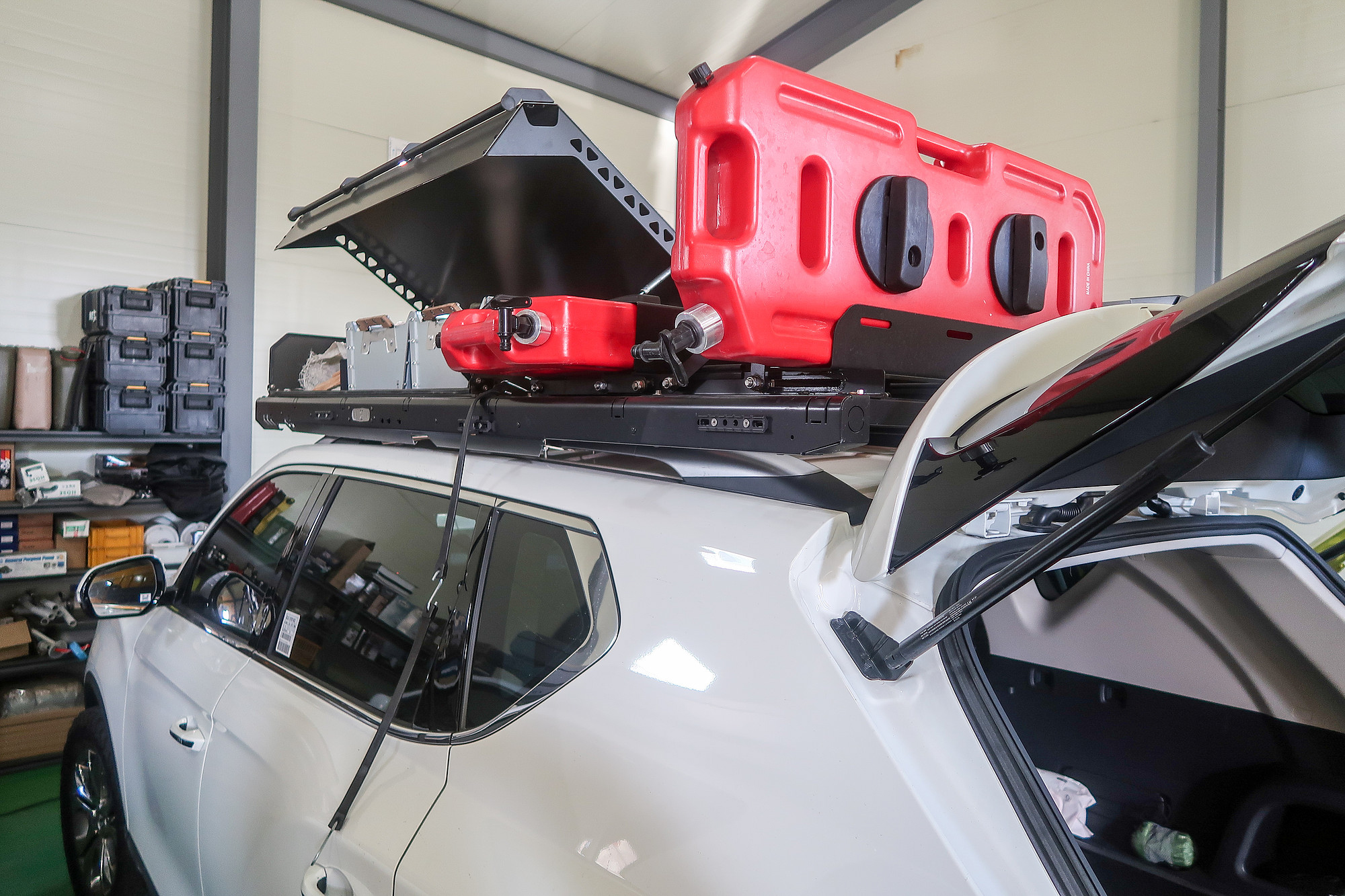


With the adrenaline still gushing through my veins from the near accident I put the brake problem as the top priority on my to-do list and asked if the guys could help me analyze the recurring problem that many wizards in the Land Cruiser world had not been able to fix.
Changwoo turned out to be a saint, having the patience and a perfectionist’s drive to tackle this challenge. Luckily, it was a quiet time at the Romance Factory and in anticipation of their first overseas overlanders to visit their shop, Mr. Fish had set up a four-bed dorm at the back of their canteen. He invited us to stay as long as we felt comfortable.
“Let’s call it a night. We’ll disassemble the master cylinder first thing in the morning,” Changwoo said while picking up his jacket and heading for the door.
“I think gremlins must be hiding inside,” I joked.
“Let’s set them free. Tomorrow!” And off he was.
The Brake Problem
A couple of days earlier, the Romance Factory team and I had started tackling the problem as any mechanic would: by bleeding the brakes, adjusting the rear drums and checking for leaks. They were the exact same steps I had gone through a number of times over the last year in different workshops. And while the serious brake problems had started a little over a year ago, the basis for them had been laid almost 10 years earlier, during the rebuilding of our Land Cruiser from frame up in Bolivia, South America. Let me save the embarrassing details for the end.

One and a half years ago we had said goodbye to our most generous host and workshop to date. Mr. Nakashima of Friendee Auto (on Kyushu Island in Japan). His family and team had adopted our Land Cruiser and ourselves in their home and workshop and replaced so many parts that the Land Cruiser is almost new on the inside. Yet I remained dissatisfied with the braking capabilities of our heavy Land Cruiser which, in fact, had worsened since our arrival at the workshop. Steep descents proved especially tricky. After numerous test drives and yet more new parts, things improved but were far from perfect. We felt we couldn’t steal any more precious time and resources from Friendee Auto and his team, plus the clock was ticking. We were eager to get to the coldest northern point of Japan in the middle of winter, so we honked the air horn and waved goodbye.

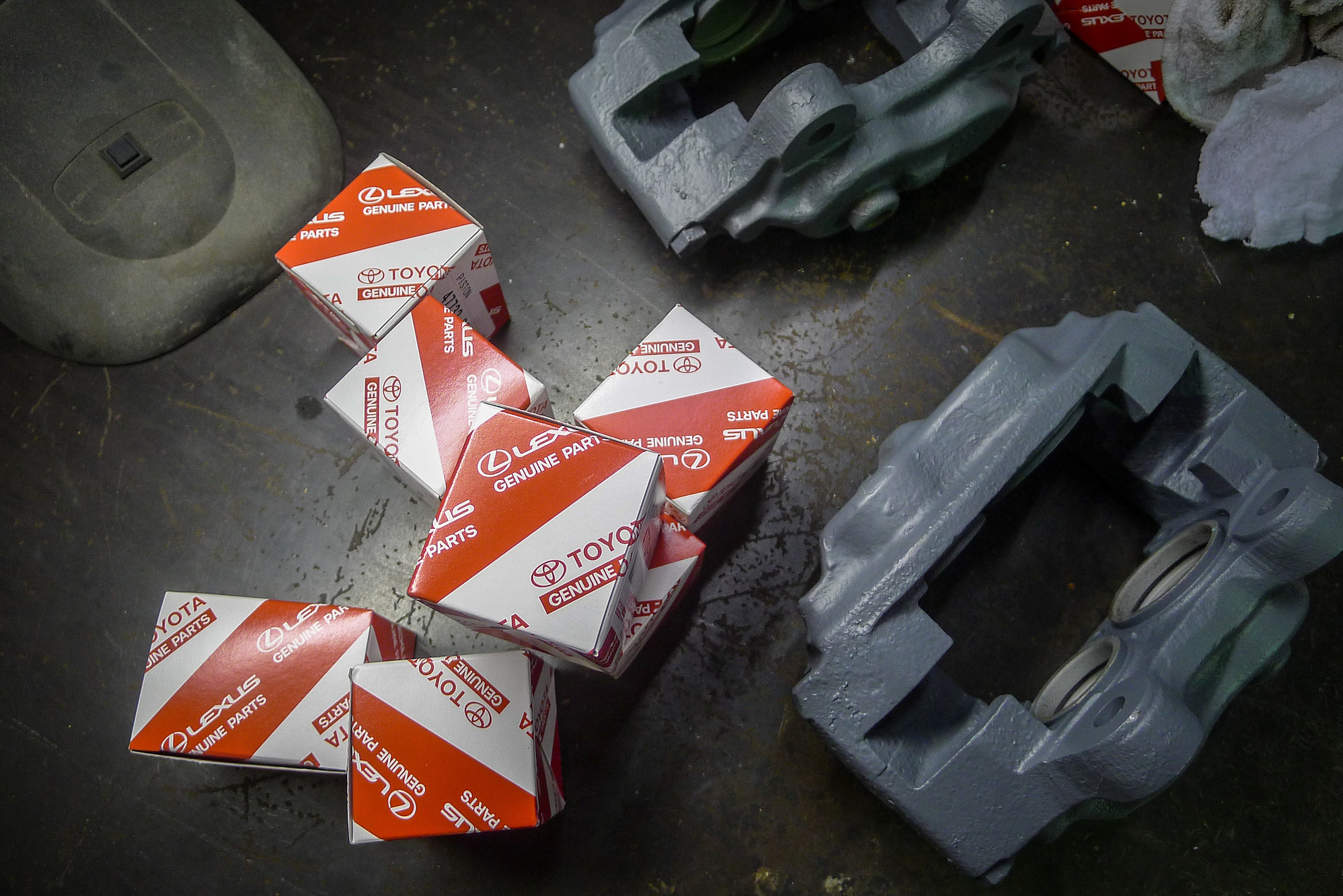
During the year that followed, Mr. Nakashima and I kept in contact, trying to nail that nagging detail causing the Land Cruiser’s lousy braking. We stopped at some of his friends on our way north to test yet another brilliant idea. To no avail.
How could we be driving a heavy Land Cruiser with malfunctioning brakes? The little 3B diesel engine has excellent compression and anticipating traffic lights I downshift and use the power of the strong engine to slow down. Firmly pushing down the brake pedal does the rest. As a result I hardly every slam on the brakes. However, on occasion, especially on a steep descent, we had a few near misses that sent the adrenaline and our tension through the roof. I would press down the pedal for all I was worth, and all the car did was slow down and continue sliding forward. Repeated pumping was required and the last time—a few weeks ago—pulling the handbrake had saved the day.
What on earth could possibly be wrong?! After all, check out this list with all the brake-related parts that had been replaced by Mr. Nakashima:
– front brake calipers: sandblasted and repainted
– front pistons and seals
– front brake pads
– flexible brake line front
– rotor disks front
– brake linings rear
– brake pistons rear
– load sensing proportioning valve
– good second hand drums rear
– new brake master cylinder
– good second hand brake booster
– good second hand vacuum pump


What else was there to be replaced?! This question kept haunting Mr. Nakashima and me for more than a year. When the issue finally got resolved, he was as happy as I was to hear that the root cause of the problem had been my own fault and not his.
Searching For the Solution
Changwoo worked methodically and eliminated a few gremlins one by one. The first thing he came across was a leaking vacuum tank. As he sprayed the tank with soapy water and pressurized the vessel, we saw bubbles coming from both sides. We hooked up another tank with new hoses and did another test drive, however, the problem dragged on. The next item in line was testing the brake booster, and we measured the maximum push rod travel, which we noted on a piece of paper. Subsequently, we measured the maximum travel of the master cylinder and came to an astonishing conclusion: they did not correspond.


We gave our brains a break to digest this new piece of information and enjoyed one of Karin-Marijke’s dinners.
“Why don’t you call Rocco?” she asked.
She must have overheard our broodings when she suggested calling the one and only real Land Cruiser specialist we know in the Netherlands.
“Good idea. I’d like to hear what he thinks of this new piece in the puzzle.”
For as long as we have been driving this 34-year-old Land Cruiser, every time I haven’t been able to solve a difficulty, a quick telephone call to Rocco has set me on a different path of thinking to tackle it. After our late dinner, I called him and explained the situation.
“It sounds as if you are braking only on half power. It seems the master cylinder is not traveling the whole way as it should,” Rocco suggested.
“Okay, why could that be?” I asked.
“It sometimes happens that people mix up the two pistons, or your piston #2 is stuck behind the stopper bolt.”
“Hmmm.”
“Yeah, either one or the other is my guess. Good luck!” And he hung up.
Rocco is a no-nonsense man and doesn’t like wasting time. I had liked that from the beginning, especially when we didn’t have Skype yet, back in the days when I had been calling from a payphone.
Meanwhile, Changwoo had gone down to his office and had come to the same conclusions via a wholly different line of thinking. His was that while bleeding the brakes, the pedal never traveled deep enough when the pressure was released.
In the meantime, I had also messaged Mr. Nakashima and asked him if he had opened the master cylinder and if so, if it could have been installed in reverse. “Impossible,” was his answer. It was a new, sealed unit, straight from the Toyota warehouse.
“What is that smile on your face?” Karin-Marijke asked after I brushed my teeth and was ready for bed.
“Oh, nothing. It’s just that we are going on a gremlin hunt tomorrow,” I smirked.
“Gremlins? Like in the movies?”
“Yeah, sort of, but this one is real!”
“Oh okay, well, I do hope you nail the blighter because I want to hit the road again, but not with those failing brakes! Goodnight, love.”
Early in the morning, when I walked into the workshop, Changwoo was already at it and had unclipped the snap ring just in time for me to see the mystery unfold. Slowly he released the tension and out came piston number one. Undamaged. After having removed the stopper bolt, piston number two came out. It was undamaged and not stuck behind the bolt. All our faces expressed the same quizzing look, and our brains were shifting gears.
Nothing was wrong!

How frustrating. The one time I would have loved to see that something was wrong was right now.
I now too believed what Changwoo had told me earlier about the pedal not lowering to the deepest point while releasing the pressure during the bleeding process. The question was why this was happening.
Next on the list was the testing of the load sensing proportioning valve and the brake lines to see if they were restricted in any way. With the master cylinder out of the way, we applied air pressure to the front and rear brake line to see if every bleeding plug had a free flow or not.
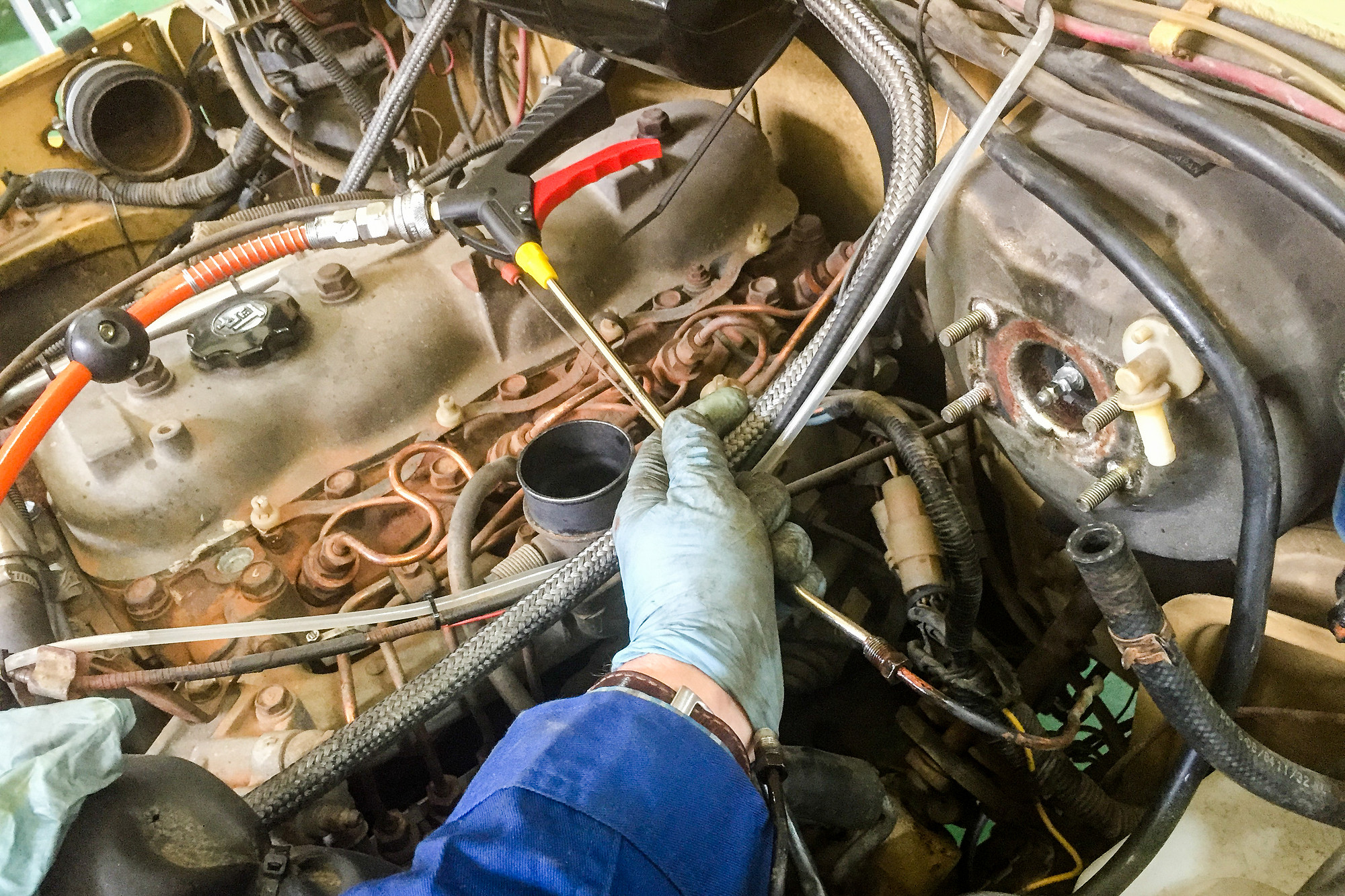
“Yeah, check.”
“Okay, next.”
“Yep, also flowing.”
“Next.”
“Yes, also here.”
“What?! That is strange. You see a flow from the rear while I blow air in the front line?” I was confused.
“Hmmm, yes, that is bizarre indeed. Let’s check the rear line. Blow some air in there.”
“Nope, nothing.”
“Really?”
“Yes, I’m telling you there is nothing coming out of the rear bleeder plugs.”
“So that must be it then. The line is clogged or damaged, causing the line to be obstructed.”
“Let’s disconnect those rear lines and see what’s going on.”
Once disconnected we found them both flowing normally. These lines had us confused, for sure.
Eureka!
During lunch, I asked Changwoo to explain to me once more the basics of the load sensing proportioning valve. The set up of the lines confused me, and as he talked about the entry, exit, and return lines, I suddenly felt dizzy.

“I need to check something.”
As I excused myself from the table, I ran downstairs to look in my beloved parts catalogue. While searching for the right pages I felt my heart racing. Could I have been so stupid? Could I really?!

There it was, the complete schematic of the brake lines of our BJ45. Retracing the lines from front to back I shook my head in disbelief.
“So, what did you find?” Changwoo asked.
“I screwed up.”
“You did?”
“Yes, years ago in Bolivia. I probably mixed up the entry and return line to the load sensing proportioning valve.”
“But you said you never had problems before last year in Japan?”
“True. I bet that the old load-sensing proportioning valve never worked properly and that, as a result, the valve worked both ways. Only after Mr. Nakashima had replaced the load-sensing proportioning valve did it resume its proper function. However, the rear brakes were obviously never activated. Only a little, of course, because of the overflow from the front via the return line to the rear.”
“Could it be so simple?”
“I’m almost certain of it.”
“Let’s find out. We will get some new lines while we are at it and connect them the other way around.”



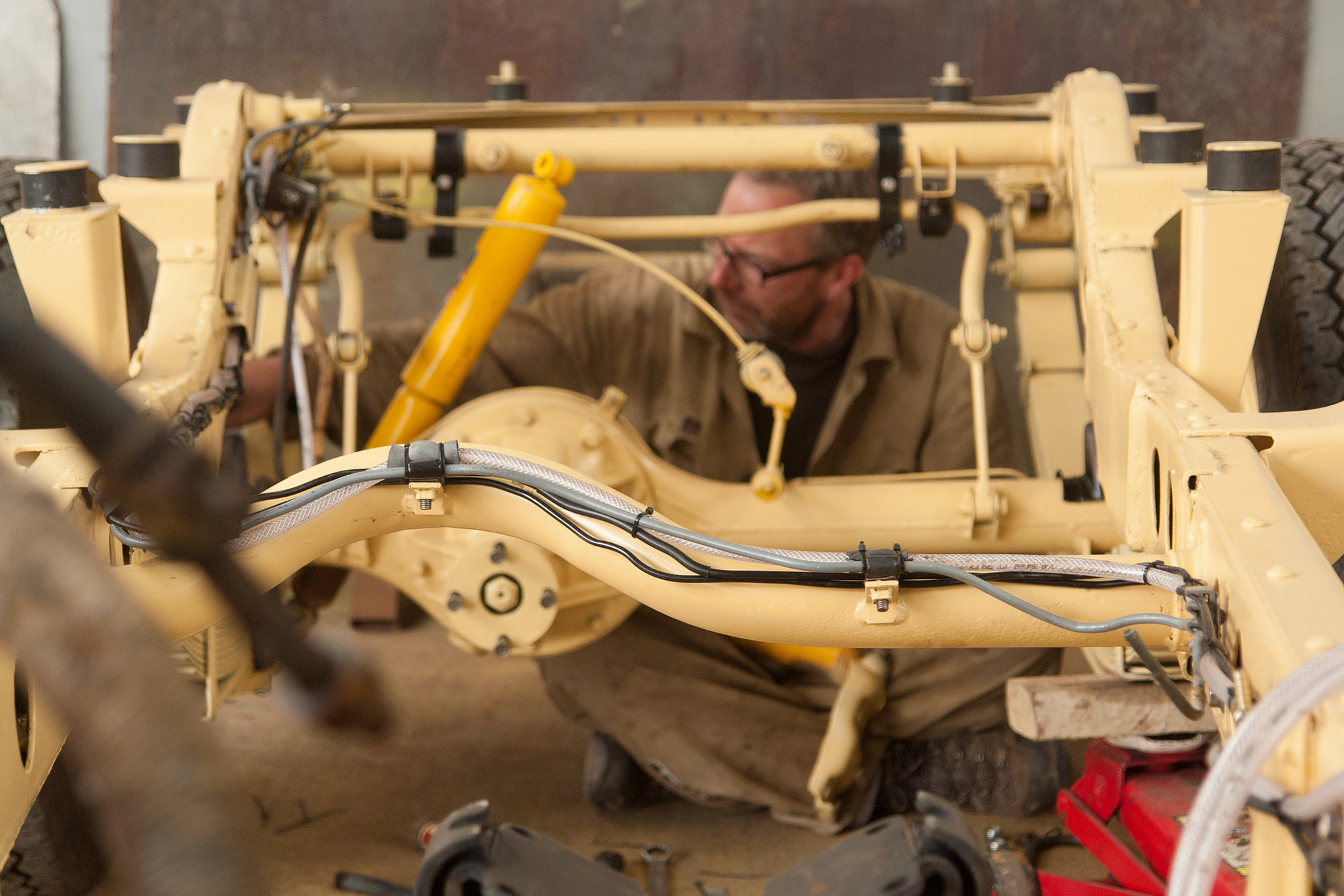
After having refitted new lines and bled the heck out of those lines three times with the load-sensing proportioning valve in three different positions, it was time for our final test. I didn’t dare to drive; I was too nervous. Changwoo drove us down the narrow road going down a slight incline, exactly where we had been test driving the whole week. Every time it had been a frustrating drive.
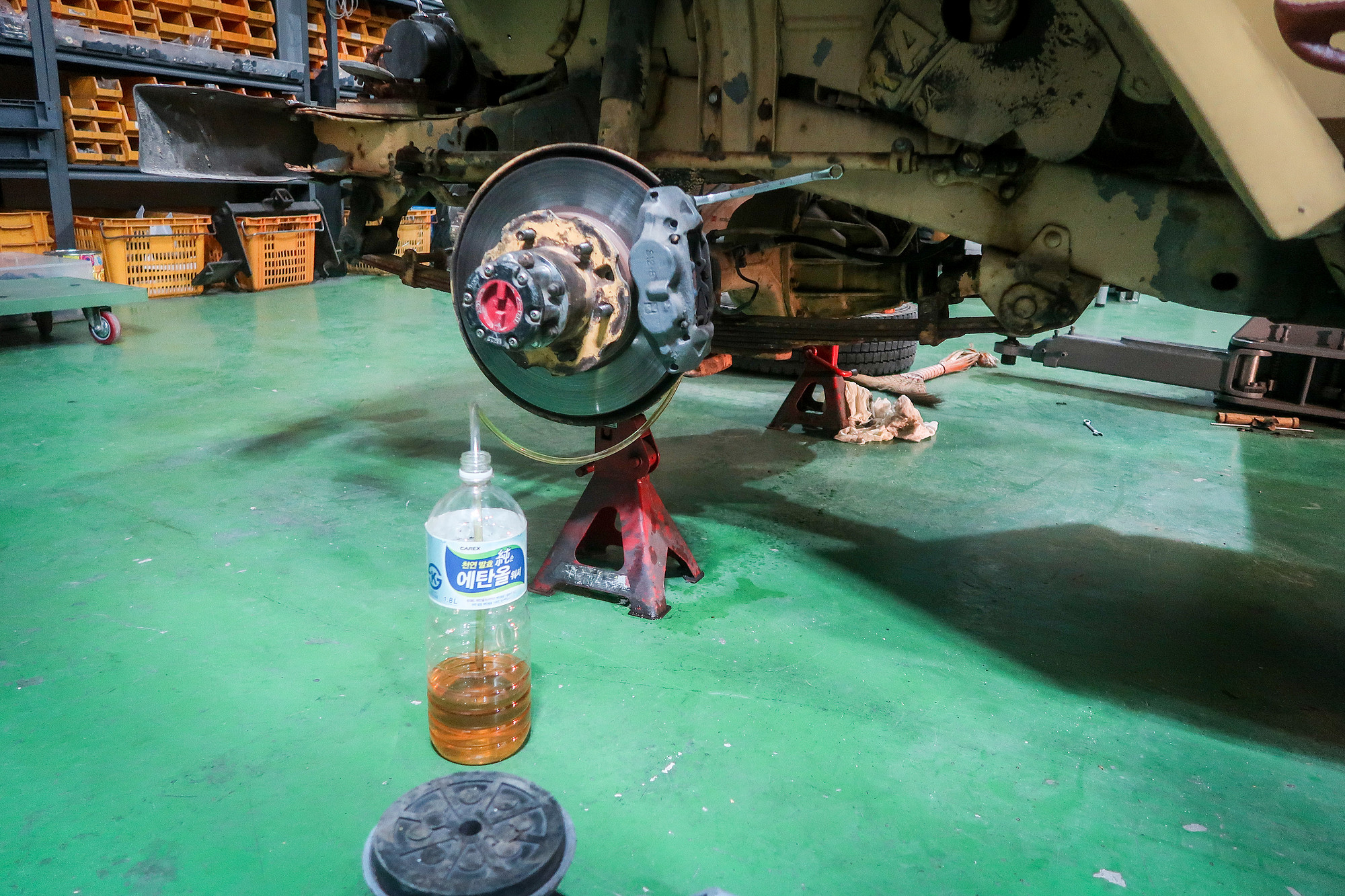
Now, on the first firm application of the brake pedal, our bodies lurched forward, and I felt the seat belts lock immediately.
“Oops, sorry!” Changwoo laughed.
“Yeah, we did it!” I yelled and gave him a high five.
“The gremlins have been defeated!”




